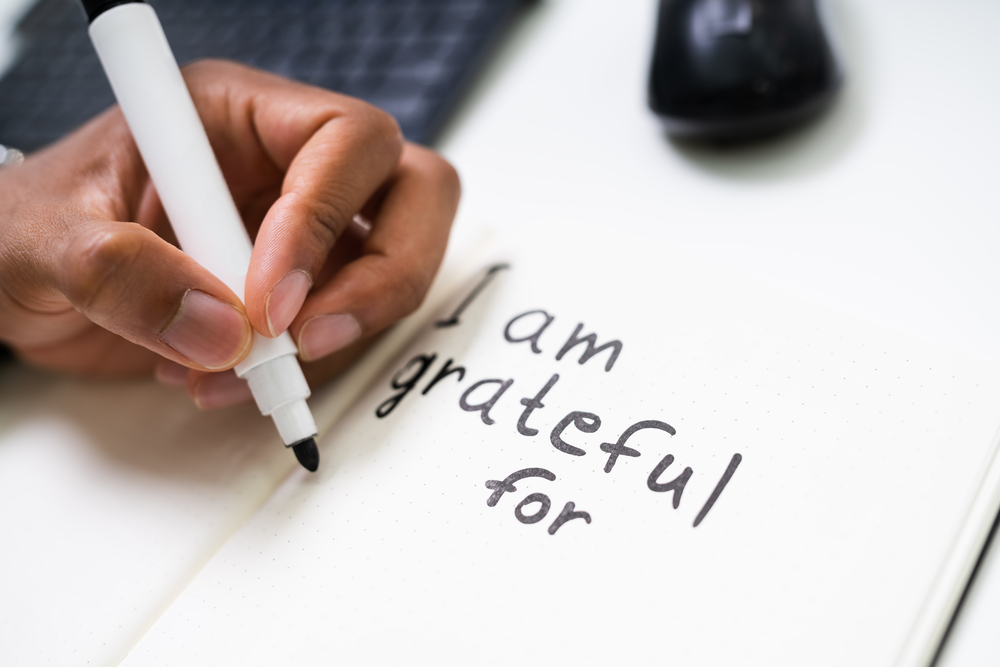Why Gratitude Was Doing Me More Harm Than Good
Be grateful for what you have! Keep a gratitude journal! Gratitude is good for you!
Gratitude messaging is everywhere. In every self improvement book I read, on half of the memes I see on social media. And for good reason. The science to backup the many benefits of gratitude is there. I, too, kept a gratitude journal up until circa 2020.
But 2020 is when I started coming to terms with some of the uglier things that have happened to me. I’ve spoken openly about many of my struggles since, but it took me a long while to come to terms with some of those struggles in my own head, let alone speak those struggles aloud. And that was uncomfortable for me because I’d been used to smiling through nearly every experience, while keeping in mind my gratitude for all of the amazing things I did have, and being praised for doing so.
I lost my mother when I was 6 years old. But I was so grateful to grow up with a loving family, so it was okay.
I was abused by a racist gymnastics coach. But I was grateful that I wasn’t the target of frequent or overt racism, so it was okay.
I went through a severely traumatic labor and delivery experience. But I was grateful that I birthed a healthy baby boy, so it was okay.
These were just some of my life’s most challenging moments. And to be completely honest, it’s difficult for me to even write the truth, as though somehow naming the tough stuff comes off as ungrateful. Gratitude seemed to get me, not through these difficult experiences, but past them. So I’d continued to be grateful. I’d continued pushing the buried pain to the side and smiling through.
And don’t get me wrong. I have a whole lot to smile about, and on a very regular basis. I wouldn’t trade my life for anyone else’s. But there are times for all of us when life doesn’t feel beautiful, when traumatic things happen. And what I didn’t realize was how I’d been, inadvertently, covering up my pain, and in some cases, my trauma, with gratitude and positivity.
The way I understood gratitude, the way I was using it, was fueled by my people pleasing, my instinct to make everyone comfortable, and to prove to everyone that I was okay. So “gratitude” covered up many valid, negative feelings that I should have worked through, not past. It’s okay, smile! There’s so much to be grateful for!
It was a startling and jarring realization that made me question my gratitude practice altogether. I’m no mental health professional, but I have learned since 2020 that trauma does not just go away because you’re grateful you don’t have it worse. Trauma that you don’t deal with has a way of resurfacing when it’s not directly dealt with.
According to Lisa Firestone Ph.D. on Psychology Today:
Unresolved trauma can haunt us throughout our lives in ways that often don’t seem direct. As adults, we may attempt to forget or gloss over the past. We may think, “My childhood wasn’t that bad” or “Many people had it worse than I did.” We don’t realize that these old wounds can have all kinds of physical and psychological effects. Certain events may involuntarily trigger reactions in us that we haven’t thought about in years: guilt, shame, fear, or anger sourcing from early in our lives.
Attachment research suggests that it isn’t just what happens to us that affects us and our relationships. We’re also affected by the extent to which we haven’t been able to feel the full pain and make sense of our experiences. When we don’t deal with our trauma, we carry it with us. We haven’t made sense of our story, and therefore, our past is still impacting our present in countless invisible ways.
So while it might be awesome to gratitude your way through a bad day, or a mild inconvenience, you can’t cover up the big stuff with gratitude. That’s not the point of gratitude at all.
Forced Gratitude
For those of us who have a habit of covering up the tough stuff in life with gratitude, there’s some bad news. People, in general, do not love being uncomfortable. And you know what’s uncomfortable? Seeing someone in pain, or worse, sitting with someone in their pain. The instinct (at least for me, when I’m encountered with someone in pain) is to try to fix it. To try to point out why it’s not so bad, and to make it smaller. To come out with the all-too-common, and all-too-damaging, “at least”.
I first noticed a whole lot of “at leasts” on my pregnancy journey:
“Oh, you had a miscarriage? At least you’re young and have lots of time to try again. Be grateful for that!”
“Oh, you had two miscarriages? At least you know you can get pregnant easily. Be grateful for that!”
“Oh, you had a traumatic labor and delivery? At least you have your baby now. Be grateful for that!”
I think the majority of people are guilty of being “at least” people on occasion (I know I’ve been guilty!), and these people mean well when they say “at least.” They are trying to get you to focus on the good. But the problem with “at least” is that it attempts to minimizes the pain. It encourages the person in pain to put their grief, hurt or trauma aside because “at least” it isn’t worse and “at least” there are positive things to focus on instead.
I heard these “at least” phrases over and over again on my pregnancy journey. And what it felt like, every time, was that people were trying to force me out of the awfulness of the experience I’d gone through. But the pain from the pregnancy trauma didn’t go away, no matter how much gratitude I threw at it. And I felt I couldn’t share my true feelings with the world, because everyone was throwing me “at leasts” left and right. I was getting the messaging that I should just move on and be grateful for the child I had.
Gratitude was being used as a weapon against me. And I had been using gratitude as a weapon against my own pain.
But gratitude for having a healthy baby boy wasn’t what healed that trauma, though having him has been the greatest blessing of my life. What healed the trauma was working through it with my writing, connecting with a community of other women who’d been through similar pain, and being open about my feelings with my support system. I had to go through it to resolve it — to come to a healthier place where I could make sense of what happened to me. Then, amazingly, I found I could be grateful for all of the resources that helped heal me. And the gratitude I felt for having my baby didn’t have to cover up anything at all. It could just be.
How I Was Doing Gratitude Wrong
Don’t worry. Gratitude and I made up. I just realized that I was doing it wrong. I was misunderstanding it.
Gratitude shouldn’t replace pain. It’s not a blanket, it’s a light in the dark. Scary things in the dark are still there when there’s light, but with a bit of light, with a bit of gratitude, we can see a fuller picture of the room. Gratitude should walk alongside the tough stuff, hand in hand. The huge mistake that had caused me to resent the practice of gratitude in 2020 was that I’d thought of it as a but, not an and.
Feeling the grief of an unresolved trauma, or longing for something you wish you had, doesn’t mean you’re not grateful for what you do have. Acknowledging your pain does not make you ungrateful. This is a lesson I am still learning — messaging I picked up at some point in my young life that I am still unlearning. You can feel pain, and you can feel grateful for the good. I can recognize that my pregnancy journey was traumatic, and I can take steps to heal myself, and I can be grateful for my beautiful baby boy.
Gratitude doesn’t wipe out the pain. It reminds us of the joy in our every day lives while we struggle, or while we heal.
When talking with struggling friends, I’ve made a massive effort to wipe any phrase that begins with “at least” from my vocabulary. I mean, how wild is it that when someone is expressing pain, our go-to response (mine too) is to jump to “look at what you do have”? As though we can distract from pain by saying, “Hey! Look over here! This is fine, so what you’re going through is fine too.”
If someone was hurting after breaking their arm, would our first instinct be to say, “At least you have a good leg!”? Nope. I would acknowledge their pain, empathize with them. I’d ask how I could help if I were able. I’m not going to minimize their pain by suggesting they should feel grateful for their other uninjured limbs.
That person can acknowledge the pain of their broken arm, and they can be grateful the fall wasn’t worse. But that’s their business. I don’t think any of us should try to force the gratitude. That’s not how gratitude works.
I have now returned to my gratitude journal, and I make an effort to write in it every day. Because the truth is that there are things to be grateful for every single day, big and small, and they are always worth acknowledging. For me, they are regularly my loving family, my toddler’s laugh, my supportive friends, good cheese, the chance to move my body, life-changing books, delicious coffee, and so much more. But these beautiful things that I am grateful for are not blankets to shield or cover. They are lights. Hands to hold. They are sparks of beauty in my life.
No experience should cover others, or negate others. Acknowledging the entirety of my experiences, from painful to wonderful, makes me feel like a whole person. ‘And’, not ‘but’. It may seem like a small shift, but to me, it was everything. It was what set me on a path to actual healing, and what reunited me with a daily, and healthy, gratitude practice.


Thank you for your comment, for which I am really grateful. I’ve found that acknowledging, not minimizing pain, has set me on the true road to recovery numerous times. By the way, your beautiful son is, I think, a very lucky little boy. Best wishes.